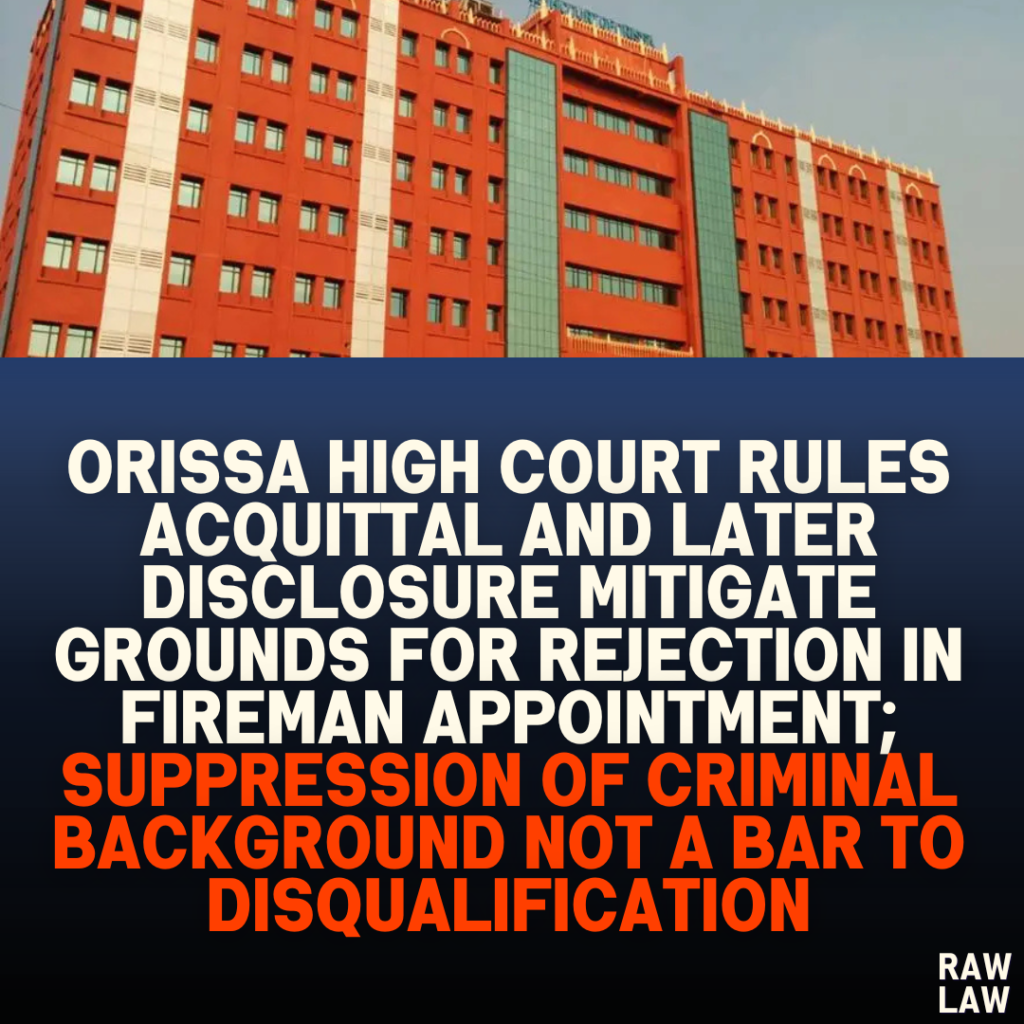Court’s Decision:
The Orissa High Court held that while the acquittal in a criminal case does not disqualify a candidate from employment, withholding information about pending cases can be grounds for rejection. The court found that the petitioner did not suppress any information about his criminal case since he disclosed it during the verification process. The decision highlighted that the petitioner was unaware of his criminal case at the time of application and that his acquittal did not automatically entitle him to the position.
Facts:
The petitioner, selected for a temporary fireman role with the Odisha Fire Services, applied in 2014 and later disclosed involvement in a criminal case during verification. He was accused in a case filed before the application date, but claimed he was unaware of it until after he had applied. Although he was acquitted in 2020, his application was rejected in 2020 due to alleged suppression of criminal history.
Issues:
The central question was whether the petitioner’s lack of disclosure about a criminal case in his application constituted grounds for disqualification, despite his later acquittal.
Petitioner’s Arguments:
The petitioner argued that he disclosed all required information in his verification form and was unaware of the case when he initially applied. He contended that his acquittal nullified any negative implications on his employment eligibility and requested a directive for his appointment as a fireman.
Respondent’s Arguments:
The respondents argued that the petitioner’s involvement in a criminal case impacted his suitability and that his application’s omission of this detail raised concerns about his integrity. They maintained that his acquittal did not negate the initial disqualification due to non-disclosure.
Analysis of the Law:
The court evaluated the implications of suppression or non-disclosure of criminal involvement in employment applications, citing rules that mandate transparency. It emphasized that suitability and moral character remain critical, even if acquittal occurs later.
Precedent Analysis:
The court considered precedents, including State of Odisha vs. Gobinda Behera and Union of India vs. Avtar Singh, which clarified that suppression of criminal involvement in job applications may warrant disqualification depending on the offense’s nature and context. Notably, the court distinguished the present case from these precedents as the petitioner had disclosed his involvement later in the verification process.
Court’s Reasoning:
The court found that the petitioner did not deliberately suppress information but rather disclosed it when aware, aligning with principles of fairness. It noted that his acquittal further mitigated concerns about moral character, thereby weakening the justification for rejection based on non-disclosure.
Conclusion:
The court concluded that the petitioner’s application was wrongly rejected on grounds of suppression, as he had subsequently disclosed the information and had been acquitted. The rejection decision was thus overturned.
Implications:
This decision underscores the importance of transparency in employment applications for roles requiring high integrity and clarifies that acquittals should be considered when assessing moral character for job eligibility.




Pingback: Bombay High Court Upholds Tribunal’s ₹20.68 Lakh Compensation in Motor Accident Claim, Rejects Insurance Company’s Challenge, Affirms "Income Can Be Assessed" Without Multiple Returns - Raw Law